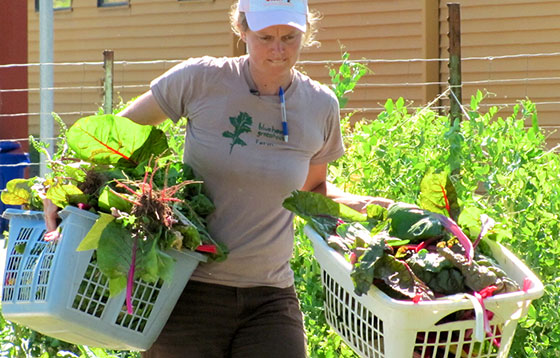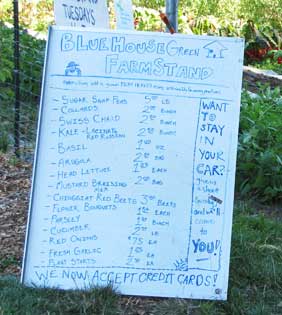Throughout her young adult life, urban farmer Amanda Morse has worked entirely in the nonprofit food sector. In college, she designed an interdisciplinary major in sustainable food systems. She worked 2 years in a youth garden project for Americorps, and 4 years in education with Food Bank, also running one of their demonstration food gardens. When she moved to Portland, Oregon, she was ready to apply her skills in a new direction.
Knowing she wanted to live in the city, Morse decided to become an urban farmer. She began researching vacant plots of land in the city using Google Maps and other online resources to contact prospective property owners about leasing their land. When the owner of the Tropicana Barbecue restaurant in North Portland responded favorably, in the winter of 2011, Morse was able to begin transforming the ¼ acre parcel adjacent to the restaurant into her Blue House Greenhouse Farm.

The land had been vacant since 1967 after a chemical warehouse on the property burnt to the ground, and over the years gained local notoriety as mistakenly being on the Superfund list. Working with the Local Department of Environmental Quality, Morse had the soil tested for heavy metals; it came out essentially clean, meaning she says, the recorded amounts were well below average residential levels.
For two years, Amanda Morse has grown food almost year-round on the farm. Resembling an alphabet soup of diversified food crops, she grows: green beans, beets, different mixes of salad greens, chard, peas, gray zucchini, onions, varieties of kale, collards, basil, parsley, cilantro, many kinds of tomatoes, peppers, cucumbers, winter squash, radishes, thornless raspberries, and turnips. She also raises honeybees for local honey.
She markets her food to nearby residents that come to her farm stand on Tuesdays, and to area restaurants that place a premium on buying fresh and locally grown ingredients to serve their own clientele. Morse is part of a growing trend of urban farmers who are reinventing the notion of where farming takes place.
Being part of a local and vibrant urban community is what Amanda Morse loves most about her chosen lifestyle. And, in her own small way, at least for now, she is helping to create a food oasis in the community where she lives, works, and plays.
Most of the videos featured on Cooking Up a Story were produced, filmed, and edited by Rebecca Gerendasy. Fred Gerendasy contributed as a writer to many of the posts and occasionally as the interviewer. Visit Rebecca Gerendasy Clay – Art and Fred Gerendasy Photography to see their current work.

